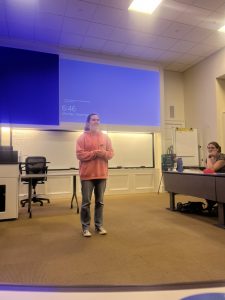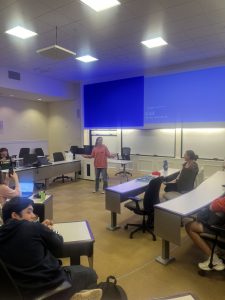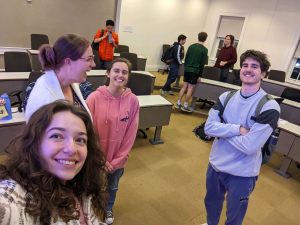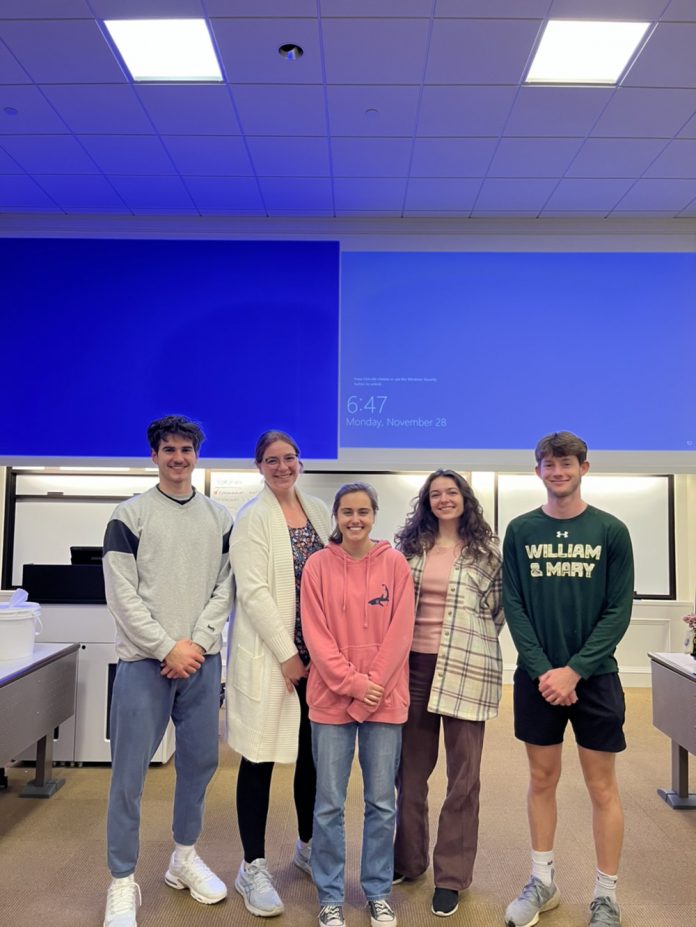Operating since the beginning of 2021, the Toastmasters Club at the College of William and Mary has served as a forum for students to give speeches and receive feedback in a safe environment. Armed with the goal of improving the public speaking capabilities of its members, the Toastmasters Club has intended for its benefits to be applicable in all facets of their lives.
Club treasurer Thomas Lavelle ’25 explains that its self-definition escapes the purview of an organization with only professional or academic significance.
“At the end of the day, that’s what we love to do: help people work on their public speaking in a safe environment where we could give constructive criticism, but also have a good time,” Lavelle said.
Meeting for an hour every Monday evening, the organization kicks its sessions off by listening to long-form prepared speeches. Those asked to give these speeches are rotated throughout the club’s membership, and speakers are encouraged to discuss any topic interesting to them.

A large perceived benefit for those participating in the club comes from the reactions garnered in the club meetings from these speeches. Areas for improvement that are often touched upon include speakers’ posture, tone and distracting excess movement. Feedback is meant to be largely constructive, pointing out areas of weakness in speakers’ presentations, while also encouraging one another by focusing on strengths.
After two or three prepared speeches are delivered, club meetings move into an improvisational section dubbed “Table Topics.” A previously selected “Table Topics Master” will come to the meeting prepared with a topic of their choice and proceed to call on random club members to give their takes on the topic.
Like the longer prepared speeches, the lightning Table Topics speeches are meant to be critiqued and taken as opportunities for growth as public speakers. As multiple club members participate in this process, club secretary Katherine Lenshin ’26 shared that the majority of most meetings is spent giving and discussing these impromptu speeches.
“It’ll be topics like, ‘Oh, if you were president for a day, what would you do?’ or, ‘What’s a book that you recommend everyone read at least once in their lifetime?’” Lenshin said. “You have to think of an answer on the spot and give a presentation on it in just one to two minutes.”
Wanting to encourage participation among all of the club’s members, club meetings conclude with the selection of temporary leadership roles, which are meant to be carried out at the following meeting. These roles include Table Topics Master, responsible for choosing Table Topics and picking impromptu speakers, an Uh Counter, whose duty is to point out how many verbal crutches such as “uh” were used in any given speech and a Chief Evaluator, who takes charge of writing down key areas where speakers could improve.

“We just like to get as many people involved as possible,” Lavelle said. “Obviously, if it’s the same few people doing the same few roles it gets a bit boring, and it just encourages more creativity.”
In addition to measuring undesirable speech habits, the club engages in what is called the “Compliment Sandwich method.” After hearing feedback from the “Chief Evaluator” and the “Uh Counter”, everyone else at the meeting is encouraged to offer their ideas on highlights and weaknesses by in turn offering a compliment, a critique and another compliment. This method of discourse is meant to allow evaluators to improve their skills by commenting on others’ talks. Additionally, it is meant to foster a nonthreatening space suited for college students not entirely comfortable with public speaking.
Consistent with the leadership team’s wishes to sustain an environment specifically catered to college students have been their efforts over the past semester to separate the Toastmasters chapter at the College from the umbrella of Toastmasters International, with the intention of re-incorporating the group to the College as the Public Speaking club by the beginning of the Spring 2023 semester.
The broader Toastmasters International organization is a nonprofit that describes itself as building communication and leadership skills in its members. Though the chapter at the College was largely founded in alignment with its model, the leadership is now seeking to disassociate with the larger organization in order to be able to tailor its agenda for college students.
In separating from Toastmasters International, the club has rewritten its constitution and expects to be able to rebrand itself as the Public Speaking club after winter break. In directing themselves towards their college student audience, a desire to eliminate financial barriers to joining has been cited by the leadership as a key reason for the separation; after reincorporating, the club will not charge its members dues.

“Toastmasters International costs money, and we didn’t want students at William and Mary to feel indebted in this way to join the organization,” Lenshin said. “We just want to separate from being part of an international community so that we could focus more specifically and closely on the William and Mary community.”
Though a relatively young club at the College, Toastmasters self-defines its value not only from the practical applications that public speaking brings its members, but also in the community it is dedicated to building. Key to this, according to Club President Tobin Doherty ’25, is their goal to create a group of peers that employs nonthreatening constructive analyses of members’ public speaking exercises in order to make mastering the skill seem more attainable.
“You could be in business, you could be a biologist, it doesn’t matter; you’re going to need communication skills,” Doherty said. “We’re here to help you do that in a kind and supportive environment.”



































